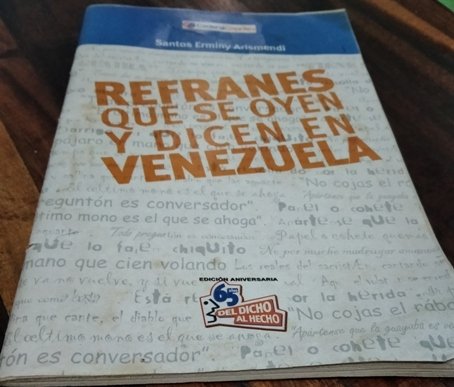[ESP/ENGL] Cinco sabios refranes venezolanos (Número 57)


Al referirse a los recortes, estos son los sobrantes de las telas que quedan al mandar a confeccionar alguna prenda de vestir con un sastre. Generalmente son trozos pequeños de tela, a los cuales difícilmente una persona que no conozca el oficio de sastre, podrá sacarles provecho. Cuando se usa este refrán, se está poniendo un límite a alguien que pretende reclamar o solicitar beneficios, en algún negocio o actividad en la cual no participó, no trabajó, o si lo hizo, fue de una forma breve o superficial. Con este refrán se deja claro, que los frutos o beneficios de algo, corresponden a quien se esforzó en ello.
Se supone que entre marido y mujer no hay secretos, así que con este refrán, se resalta la necesidad de guardar un secreto, una confidencia, una información, la cual no puede salir más allá de quien la recibe.
Ante algo que no ha ocurrido aún, sino que corresponde a un futuro incierto, no es necesario insistir o discutir. Con este refrán se invita a no preocuparse por algo inexistente, y también a no contar con beneficios que aún no se producen. Es una forma de poner límite, a la obcecación o la contumacia de alguien sobre un asunto específico, que sólo corresponde al futuro.
Para que una persona se aproveche de las limitaciones o discapacidad de otro, y de paso le dañe la forma de obtener su sustento, debe ser alguien malvado, carente de piedad; por eso, que al hacer este símil de alguien que le roba la comida a un ciego, se la come y de paso le quiebra el plato, se resalta la mala índole de una persona, su ausencia de compasión, de principios y valores universales.
Este dicho se aplica, cuando una persona es aprovechada por otros, en el sentido de que le abusan por su bondad o por su buena disposición y solidaridad. Y se usa este símil, porque en el lenguaje corporal de los animales, bajar la oreja muchas veces es un signo de sumisión.



When referring to the cuts, these are the leftovers of the fabrics that remain when sending a garment to be made with a tailor. They are generally small pieces of cloth, which a person who does not know the tailoring trade will hardly be able to take advantage of. When this saying is used, a limit is being placed on someone who intends to claim or request benefits, in a business or activity in which they did not participate, did not work, or if they did, it was briefly or superficially. With this saying it is made clear that the fruits or benefits of something correspond to whoever made an effort in it.
It is supposed that between husband and wife there are no secrets, so with this proverb, the need to keep a secret, a confidence, an information, which cannot go beyond the person who receives it, is highlighted.
Faced with something that has not yet happened, but corresponds to an uncertain future, it is not necessary to insist or discuss. With this saying, you are invited not to worry about something that does not exist, and also not to count on benefits that have not yet occurred. It is a way of putting a limit to someone's stubbornness or contumacy on a specific matter, which only corresponds to the future.
For a person to take advantage of the limitations or disability of another, and incidentally damage the way to obtain their livelihood, they must be someone evil, without mercy; for this reason, when making this simile of someone who steals food from a blind man, eats it and breaks his plate, the bad nature of a person is highlighted, his lack of compassion, universal principles and values.
This saying applies when a person is taken advantage of by others, in the sense that they abuse him for his kindness or for his good disposition and solidarity. And this simile is used, because in the body language of animals, lowering the ear many times is a sign of submission.
.png)
Dear readers, I will post the links to number 56 below, in case you want to read it:
Víctor Vera Morales. (Agosto 2004). Refranes y Comidas de Venezuela. Editado por el Instituto Municipal de Publicaciones de la Alcaldía de Caracas.
Santos Erminy Arismendi. (2006). Refranes que se oyen y dicen en Venezuela. Cadena Capriles, Caracas. Venezuela.
- Fotos de mi autoría, tomada con un teléfono REDMI 8A, intervenida con WordArt / Photos of my authorship, taken with a REDMI 8A telephone, intervened with WordArt.
- Los diseños incluidos en esta publicación, han sido elaborados por mi persona con la aplicación CANVA / The designs included in this publication has been made by me with the CANVA application.
In the event that it is required to use the content or images of this post and my other publications, I would be grateful if my authorship (Fabiola Martínez) was made and the corresponding link was cited. Thank you.

 Delegations welcome!
Delegations welcome!



These are very unique sayings, I've never heard of them before.
And it is kind of difficult to decipher the meaning of them from a mere glance. But with the explanations, they make so much sense and can be applied to a variety of circumstances.
Like the first one "the cuts are from the tailor", it is so relatable. There are moments where people who did little to no work seek to reap more than they have sown which is wrong.
I'm going to adopt these sayings and use them from time to time.
This was some nice work!
Hello @zitalove, thank you very much for this nice comment. It's good to know that you like this series, because I've been doing it with dedication for a long time. A big greeting!